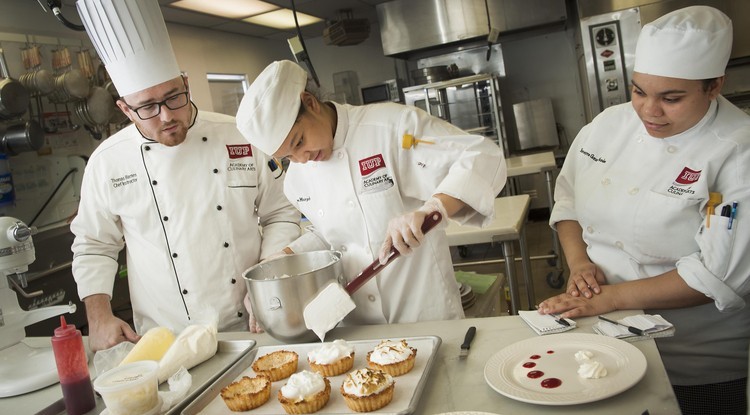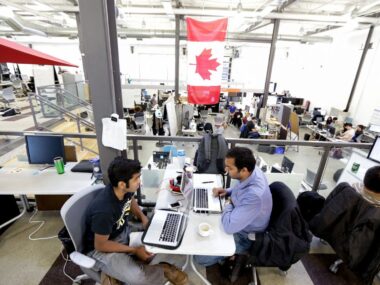Canada is renowned for its diverse culinary scene, reflecting the rich tapestry of cultures that make up the country. From bustling city restaurants to cozy rural eateries, the demand for skilled cooks is ever-growing.
For aspiring chefs and cooks around the world, Canada presents a unique opportunity: the chance to pursue a rewarding career in a vibrant culinary landscape while securing visa sponsorship to live and work in the country.
In this article, we’ll explore the various aspects of securing cooking jobs in Canada with visa sponsorship, including the types of roles available, the visa process, potential earnings, and opportunities for career growth.
Why Canada Needs Skilled Cooks
Canada’s culinary industry is thriving, and the demand for skilled cooks is higher than ever. With the country’s growing population, increasing tourism, and a strong appreciation for diverse cuisines, restaurants, hotels, and catering companies are constantly on the lookout for talented culinary professionals.
Additionally, the aging population and the subsequent retirement of experienced chefs have created a gap in the workforce that needs to be filled.
Canada’s multicultural society also plays a significant role in driving the demand for cooks. With people from all over the world calling Canada home, there is a need for chefs who can prepare authentic international dishes. Whether it’s Italian pasta, Indian curry, or Japanese sushi, the demand for culinary diversity in Canada’s food industry ensures that skilled cooks have plenty of opportunities to find work.
Types of Cooking Jobs Available in Canada
The culinary industry in Canada offers a wide range of job opportunities for cooks at all skill levels. Whether you’re just starting your career or are an experienced chef, there’s likely a role that fits your expertise. Some of the common cooking jobs in Canada include:
- Line Cook: Line cooks are responsible for preparing specific dishes or components of dishes in a kitchen. They work under the supervision of a head chef and are often assigned to a particular station, such as the grill, sauté, or pastry station.
- Sous Chef: As the second-in-command in a kitchen, the sous chef oversees the day-to-day operations and assists the head chef in menu planning, inventory management, and staff training. This role requires strong leadership skills and extensive culinary knowledge.
- Pastry Chef: Pastry chefs specialize in creating desserts, pastries, and baked goods. They work in bakeries, restaurants, and hotels, and their creativity and precision are essential for crafting visually appealing and delicious treats.
- Executive Chef: The executive chef is the top position in a kitchen, responsible for all aspects of food preparation, menu design, and kitchen management. This role requires extensive experience, leadership skills, and a deep understanding of culinary techniques.
- Catering Cook: Catering cooks prepare meals for events such as weddings, corporate gatherings, and private parties. This role often involves working in off-site locations and requires flexibility, creativity, and the ability to work under pressure.
- Private Chef: Private chefs work for individual clients, often preparing personalized meals in a home setting. This role offers a high level of autonomy and the opportunity to build close relationships with clients.
Visa Sponsorship Options for Cooks in Canada
For foreign cooks looking to work in Canada, obtaining a work visa is a crucial step. The most common visa option for cooks is through the Temporary Foreign Worker Program (TFWP). This program allows Canadian employers to hire foreign workers to fill labor shortages, including those in the culinary industry.
To qualify for visa sponsorship under the TFWP, you must have a job offer from a Canadian employer who is willing to sponsor you. The employer must obtain a Labor Market Impact Assessment (LMIA), which demonstrates that there are no qualified Canadians available to fill the position. Once the LMIA is approved, you can apply for a work permit to legally work in Canada.
Another option for skilled cooks is the Atlantic Immigration Program (AIP), which is designed to help employers in Canada’s Atlantic provinces hire foreign workers. This program is particularly attractive for cooks because it offers a pathway to permanent residency after working in Canada for a specified period.
Additionally, some provinces have their own Provincial Nominee Programs (PNPs) that target specific occupations, including cooks. These programs allow provinces to nominate individuals for permanent residency based on their skills and experience.
Eligibility Criteria for Visa Sponsorship
To be eligible for visa sponsorship as a cook in Canada, you’ll need to meet certain criteria. These may vary depending on the specific visa program, but generally include:
- Job Offer: You must have a valid job offer from a Canadian employer who is willing to sponsor your visa.
- Work Experience: Most visa programs require you to have relevant work experience in the culinary field. The amount of experience required can vary, but having at least two years of experience as a cook or chef is often necessary.
- Education: While formal culinary education is not always required, having a diploma or certificate from a recognized culinary school can enhance your chances of obtaining visa sponsorship.
- Language Proficiency: Depending on the visa program, you may need to demonstrate proficiency in English or French. This can be done by taking a language test such as IELTS or TEF.
- LMIA Approval: Your Canadian employer must obtain an approved LMIA before you can apply for a work permit. This process involves proving that there are no qualified Canadians available to fill the position.
Salary Expectations for Cooks in Canada
Salaries for cooks in Canada can vary widely depending on factors such as location, experience, and the type of establishment you work for. On average, cooks in Canada earn between CAD 30,000 and CAD 50,000 per year. However, experienced chefs, particularly those working in high-end restaurants or in leadership roles such as executive chefs, can earn significantly more.
In major cities like Toronto, Vancouver, and Montreal, where the cost of living is higher, salaries for cooks tend to be on the upper end of the scale. In contrast, cooks in smaller towns or rural areas may earn less but can benefit from a lower cost of living.
Pastry chefs and private chefs often command higher salaries, particularly if they have specialized skills or work for wealthy clients. Additionally, some employers offer benefits such as health insurance, paid vacation, and opportunities for career advancement.
Opportunities for Career Growth in the Culinary Industry
The culinary industry in Canada offers numerous opportunities for career growth. Starting as a line cook, you can work your way up the ladder by gaining experience, developing your skills, and demonstrating leadership abilities.
Many chefs who start in entry-level positions eventually advance to sous chef or executive chef roles, where they have greater responsibility and higher earnings.
Specializing in a particular area of cooking, such as pastry or molecular gastronomy, can also open doors to higher-paying positions and unique job opportunities. Additionally, some cooks choose to further their education by attending culinary schools or pursuing certifications, which can enhance their qualifications and career prospects.
For those with an entrepreneurial spirit, opening your own restaurant or catering business is another avenue for growth. While this path requires significant investment and hard work, it offers the potential for greater autonomy and financial rewards.
Challenges Faced by Immigrant Cooks in Canada
While working as a cook in Canada can be a rewarding experience, it’s important to be aware of the challenges that immigrant cooks may face. Adjusting to a new culture, climate, and work environment can be difficult, particularly if you’re unfamiliar with Canadian culinary practices or ingredients.
Language barriers can also be a challenge, especially if English or French is not your first language. Strong communication skills are essential in a busy kitchen, and being able to understand and follow instructions is crucial for success.
The culinary industry is known for its demanding work hours, and cooks often work evenings, weekends, and holidays. Balancing work with personal life can be challenging, and the physical demands of the job, such as standing for long periods and working in hot environments, can be taxing.
However, with determination, adaptability, and a passion for cooking, many immigrant cooks overcome these challenges and build successful careers in Canada.
How to Apply for Cooking Jobs with Visa Sponsorship in Canada
Applying for cooking jobs in Canada with visa sponsorship requires a strategic approach. Here’s a step-by-step guide to help you get started:
- Research Job Opportunities: Begin by searching for cooking jobs that offer visa sponsorship. Job portals like Indeed, Glassdoor, and specialized recruitment agencies can be valuable resources. Networking with other chefs and joining culinary associations can also help you find job leads.
- Tailor Your Resume and Cover Letter: Your resume should highlight your culinary experience, skills, and any relevant education or certifications. A well-crafted cover letter that explains your interest in working in Canada and your qualifications for the role can make a strong impression on potential employers.
- Submit Applications: Apply to multiple employers to increase your chances of securing a job offer. Be sure to clearly state your need for visa sponsorship in your application.
- Prepare for Interviews: If you’re invited to an interview, be ready to discuss your culinary experience, your knowledge of Canadian cuisine, and your ability to adapt to a new work environment. Employers will be looking for candidates who are passionate, skilled, and able to handle the demands of the job.
- Secure a Job Offer: Once you receive a job offer, your employer will need to obtain an LMIA and start the process of sponsoring your visa. Be prepared to provide any necessary documentation and to follow up with your employer throughout the process.
- Apply for a Work Permit: After your employer secures the LMIA, you can apply for a work permit. This will allow you to legally work in Canada as a cook.
Conclusion
Canada’s culinary industry offers exciting opportunities for skilled cooks looking to advance their careers while experiencing life in a diverse and welcoming country.
With the right qualifications, determination, and a bit of culinary creativity, you can secure a cooking job in Canada with visa sponsorship and embark on a rewarding journey in one of the world’s most dynamic culinary landscapes.
Whether you’re drawn to the vibrant restaurant scenes of cities like Toronto and Vancouver or the charm of smaller towns with their local eateries, Canada has a place for you in its kitchens.
The demand for skilled cooks is not just a reflection of the country’s growing appetite for diverse cuisines but also a testament to the role food plays in bringing people together in this multicultural nation.
Taking the step to pursue a cooking job in Canada with visa sponsorship might seem daunting at first, but with careful planning, the right approach, and a passion for culinary arts, it’s an achievable goal.
As you embark on this journey, remember that every dish you create is not just a meal but a cultural experience that you share with your new community in Canada.
So, sharpen your knives, perfect your recipes, and get ready to bring a taste of your homeland to Canada’s dining tables. The opportunity is yours for the taking, and with the right mindset and dedication, your culinary dreams can become a reality in the Great White North.






